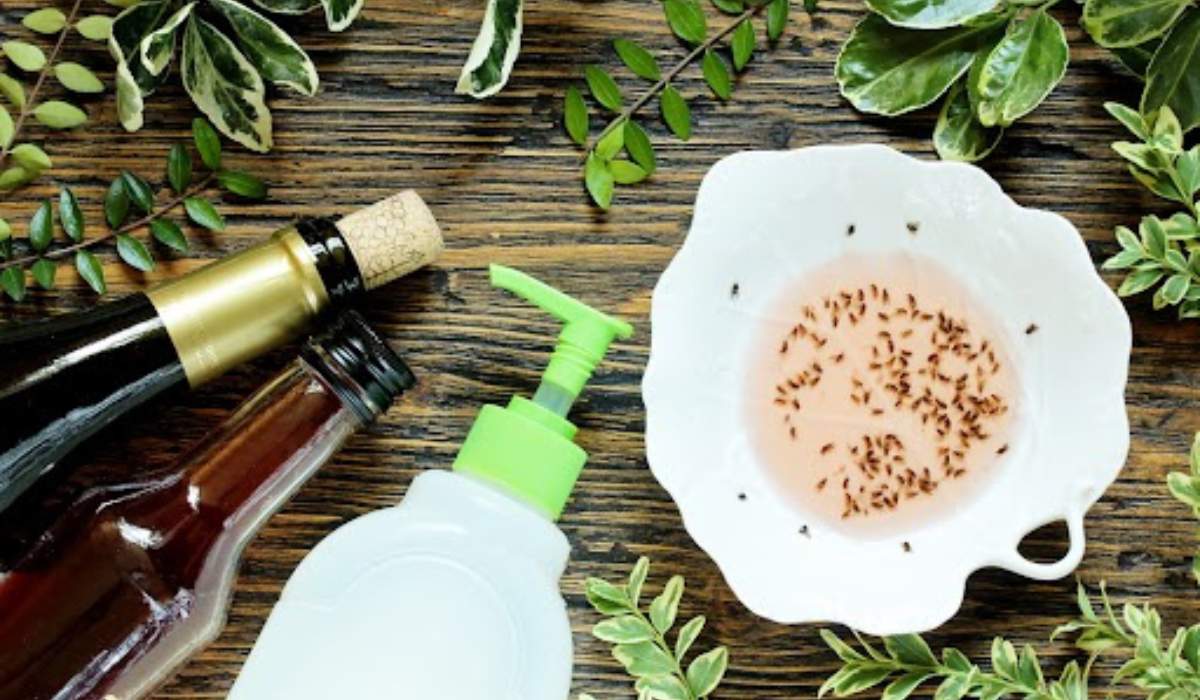Dealing with insects and bugs can be a common nuisance, but relying on natural methods to keep them at bay can be a sustainable and environmentally friendly approach. In this article, we’ll explore natural and chemical repellents, techniques to prevent bugs from entering the home, and provide answers to common FAQs to help you effectively ward off insects.
See also: How to get rid of houseflies from your home?
Types of natural repellents
Essential oils
Peppermint, lavender, citronella, and tea tree oil are known for their insect-repelling properties. Dilute these oils with water and apply them to surfaces or use them in diffusers to repel insects.
Vinegar
A mixture of vinegar and water can deter ants, flies, and mosquitoes due to its strong scent. Spraying this mixture near entry points can discourage insects from entering the home.
Neem oil
Neem oil, derived from the neem tree, is an effective natural insect repellent. It can be applied to surfaces or mixed with water to create a spray that deters a wide range of insects.
Chemical repellents that can be used
DEET
N, N-diethyl-meta-toluamide (DEET) is a common chemical insect repellent that effectively wards off mosquitoes, ticks, and other biting insects. When used as directed, it can provide long-lasting protection.
Picaridin
This synthetic compound is another effective chemical repellent that offers protection against mosquitoes, ticks, and other biting insects without the sticky or greasy residue associated with some other repellents.
The frequency of repellent application depends on factors such as the repellent’s efficacy, the duration of outdoor activities, and environmental conditions. As a general guideline, reapply natural repellents every few hours or as needed, especially if sweating or exposed to water.
Natural techniques to keep bugs and insects from entering the home
Seal entry points
Inspect your home for gaps, cracks, and spaces around doors, windows, and utility entry points. Seal these openings with caulk or weather stripping to prevent insects from gaining access.
Use screens
Install or repair window screens and screen doors to prevent insects from entering the home while still allowing for ventilation.
Clean regularly
Regular cleaning and reducing clutter in and around the home can help eliminate hiding spots and food sources for insects.
Natural predators
Introduce natural predators of common pests, such as ladybugs for aphids or praying mantises for other insects, to help control insect populations.
Outdoor lighting
Use yellow or sodium vapour lights for outdoor lighting, as they are less attractive to insects compared to white or ultraviolet lights.
Natural baits
Utilise natural baits such as sugar and borax mixtures for ants and beer traps for slugs and snails to manage pests without resorting to chemical pesticides.
Maintain landscaping
Trim vegetation and keep shrubs and trees well-pruned to minimise areas where insects can hide and breed near the house.
Utilising natural methods to repel insects and bugs offers an eco-friendly and safe approach to managing these pests. By leveraging natural repellents, implementing preventive techniques, and addressing common concerns through natural means, individuals can create a healthier and more pleasant living environment without resorting to harsh chemicals. Whether it’s using essential oils, maintaining a clean living space, or attracting natural insect predators, embracing natural solutions can effectively minimise the presence of insects while safeguarding the well-being of both humans and the environment.
FAQs
Essential oils diluted in water, such as lavender and citronella, are generally safe when used as directed. However, it's essential to be cautious and do spot tests to ensure there are no adverse reactions.
Besides using repellents, remove standing water in containers, clean out gutters, and consider planting mosquito-repelling plants such as citronella and marigolds.
The strong fragrance of peppermint oil is recognised for its ability to deter spiders.You can mix it with water and use it as a spray along baseboards and entry points.
Yes, natural repellents such as essential oils and vinegar can be safely used indoors, but take care to avoid direct contact with sensitive surfaces and materials.
Introduce beneficial insects, such as ladybugs and praying mantises, and use natural baits to manage pests without synthetic pesticides. Additionally, consider planting companion plants to repel unwanted garden pests.
Cedar chips, lavender sachets, and dried citrus peel can act as natural moth deterrents and give a pleasant fragrance to stored clothing.
Using fly-repelling essential oils, such as citronella and eucalyptus, lighting citronella candles, and keeping outdoor areas clean and free of food debris can discourage flies from gathering. Which natural repellents are safe for use around pets and children?
How can I control mosquitoes naturally?
Are there natural repellents that are effective against spiders?
Can I use natural repellents indoors?
How can I deter pests from my garden without using chemical pesticides?
Are there natural alternatives to chemical mothballs for clothing storage?
How can I naturally repel flies from my outdoor living spaces?
| Got any questions or point of view on our article? We would love to hear from you. Write to our Editor-in-Chief Jhumur Ghosh at jhumur.ghosh1@housing.com |







